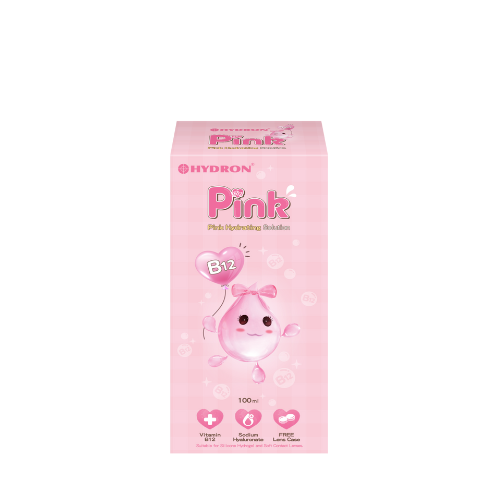Hydron Pink Hydrating Solution – 100ml
Hydron Pink Hydrating Solution – 100ml
- Vitamin B12 and Hyaluronic Acid Enhanced Multipurpose Solution
- Hyaluronic Acid formula that helps to retain moisture and provide long-lasting comfort for your contact lenses throughout the day
- Enriched with Vitamin B12 to support eyes wellness while enjoying crisp and clear vision
- Kills 99.9% of Gems
- Suitable for silicone hydrogel and all types of soft contact lenses
- All in one function:
– Clean
– Recondition
– Rinses
– Disinfects
– Stores - Extra humidifying agent : Sodium hyaluronate and HPMC
- Travel pack bottle, small and easy to bring over eg Gym / Vacation / workplace
| Vitamin B12 Boost |
|
| Hyaluronate Acid Moisture |
|
| Kill 99% of Gems |
|


Intended Uses and Indications in Labeling
The contact lens solutions is used in the daily cleaning, removing protein deposits, rinsing, chemical (not heat) disinfection and storage of soft (hydrophilic) contact lenses (including silicone hydrogel lenses) as recommend by eye professional practitioner.
Instruction of Use
- Wash hands thoroughly.
- Add a sufficient amount of Contact Lens Solution to the lens case so that when the lenses are placed in the case, they are totally submerged in the liquid.
- Remove one contact lens, place it in the palm of the hand, add various drops of Contact Lens Solution and with your index finger carefully rub in a linear direction.
- Rinse the contact lens with abundant Contact Lens Solution to completely eliminate residues.
- Repeat the process with the other contact lens.
- Place the lenses in the case, in their corresponding holders and leave all night or for at least six hours. If desired, the contact lenses can be rinsed in Contact Lens Solution before replacing them in your eyes.
Contraindications (reasons not to use)
If users are allergic to any ingredient in the solutions ,please do not use this product.
*Warnings*
PROBLEM WITH CONTACT LENS AND LENS CARE PRODUCTS COULD RESULT IN CORNEAL INFECTION AND/OR UCLER AND LEAD TO LOSS OF VISION. It is essential that you follow your eye care practitioner’s directions and all labeling instructions for proper use of lenses and lens care products, including the lens case.
Eye problems, including corneal ulcers, can develop rapidly and lead to loss of vision. Daily wear lenses are not indicated for overnight wear and should not be worn while sleeping. Clinical studies have shown the risk of serious adverse reactions is increased when these lenses are worn overnight. Extended wear lenses should be regularly removed for cleaning and disinfection or for disposal and replacement on the schedule prescribed by your eye care professional. Clinical studies have shown that there is an increased incidence of serious adverse reactions in extended wear contact lens users as compared to daily wear contact lens users. Studies have also shown that the risk of serious adverse reactions increases the longer extended wear lenses are worn before removal for cleaning and disinfection or for disposal and replacement. Studies have also shown that smokers have a higher incidence of adverse reactions. If you experience eye discomfort, excessive tearing, vision changes, redness of the eye, immediately remove your lenses and promptly contact your eye care professional. It is recommended that contact lens wearers see their eye care professional twice each year, or if directed, more frequently.
You should follow the complete recommended lens rubbing and rinsing times in the product labeling to adequately disinfect your lenses and reduce the risk of contact lens contamination. Reduced rubbing or rinsing time may not adequately clean your lenses.
You should fill your lens case with fresh solution every time you store your lenses and never “top-off” or re-use solution. You should discard your solution immediately after your lenses have been removed from the lens case. You should not expose or store your lenses in or rinse your lens case with any water, such as tap, bottled or distilled, or with any non-sterile solution.
Clean, rinse and air-dry your lens case each time you remove your lenses. In order to permit excess solution to drain, you can flip over your lens case while air drying. Replace your lens case frequently, depending upon your hygiene habits.
Failure to discard solution from lens case after each use or use of water to care for your lenses may lead to contamination resulting in eye injury and potential loss of vision. See accompanying instructions for additional important safety information.
- To avoid contamination, DO NOT touch tip of containers to any surface. Replace cap after using.
- To avoid contaminating your solution, DO NOT transfer to other bottles or containers.
- Always follow the product directions for use. Failure to follow product directions may lead to vision loss.
- Visit your eye care practitioner regularly.
- Always wash and dry hands before handling lenses. l DO NOT use tap water, bottled water or saliva with lenses or lens case. Only use fresh solution to clean and disinfect contact lenses. Always discard any remaining solution in your lens case after each disinfection cycle. Saline or rewetting drops will not disinfect your lenses.
- Always replace your solutions, lenses and lens case as directed. l To avoid contamination, do not touch tip of container to any surface. Replace cap after using. l DO NOT use with heat (thermal) disinfecting unless specifically indicated in labeling.
Precautions
- Always discard solution from lens case after each use.
- Keep the bottle tightly closed when not in use.
- Store solution at room temperature.
- Use before the expiration date marked on the carton and bottle.
- Discard any remaining solution 90 days after opening.
- Keep out of reach of children.




